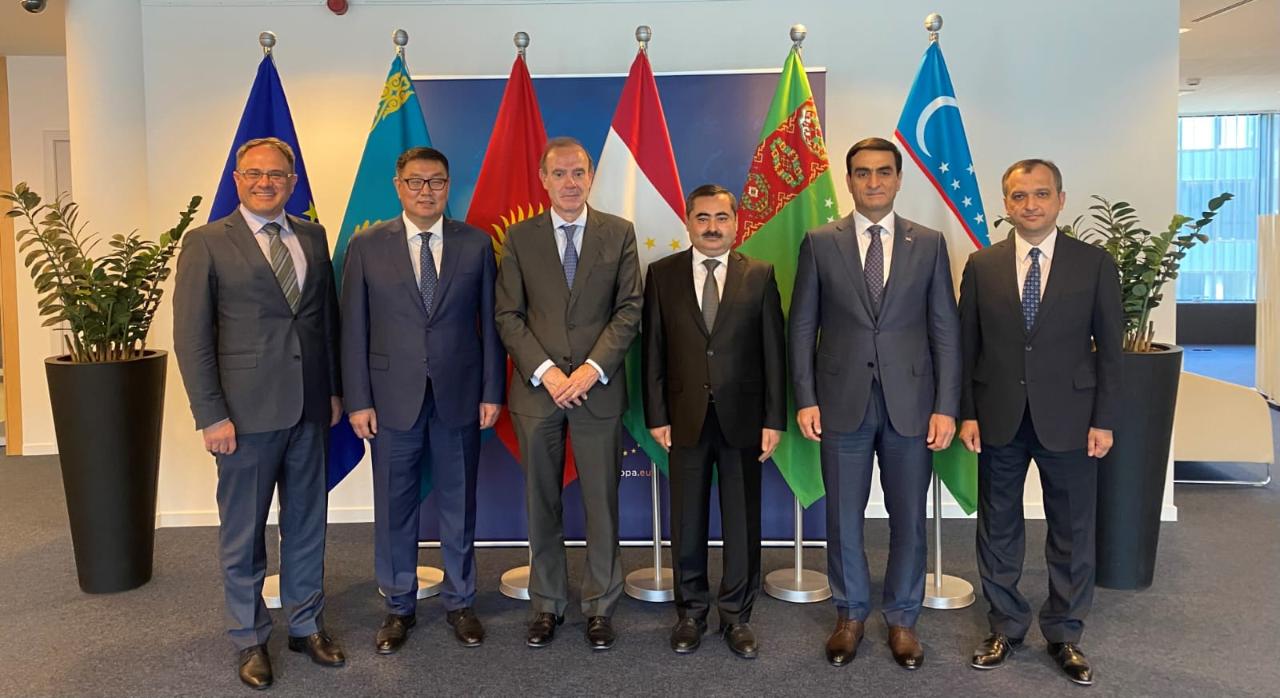NUR-SULTAN – Brussels hosted the ninth high-level political and security dialogue between the countries of Central Asia and the European Union on May 17 in an effort to advance political dialogue and strengthen security cooperation amidst the ongoing geopolitical changes in the region. Kazakhstan’s Deputy Minister of Foreign Affairs Roman Vassilenko led the Kazakh delegation.

The meeting participants. Photo credit: Kazakh Foreign Ministry
The agenda of the meeting covered current and emerging challenges to regional and global security, including food security in the context of growing politico-military challenges in the Eurasian continent, and ways to work together to strengthen security cooperation in light of recent developments in Afghanistan.
Addressing the event, Vassilenko briefed the participants on Kazakhstan’s position and proposed initiatives aimed at strengthening the stability and sustainable development in Central Asia in its cooperation with the EU. Considering the high economic risks associated with the sanctions imposed on Russia by Western nations, the Kazakh delegation stressed the need for closer coordination to prevent possible negative externalities of the sanctions regime on Central Asia.
“Over 30 years, our countries have been pursuing their independent and sovereign paths, and the European Union and its member states have always been politically and economically supportive, bolstering national development efforts and encouraging cooperation to ensure a stable and secure Central Asia, where all countries productively engage,” said Vassilenko.
According to the diplomat, the current challenges in the region and the global scene make cooperation between Central Asia and the EU more relevant than ever, requiring closer coordination of the parties.
The program of the event also featured an expert discussion on the connectivity issues between Central Asia and the EU. At a special session, the European delegation presented its vision of digital, sustainable, and transport connectivity with Central Asia in the framework of the EU’s Global Gateway strategy, a new European strategy to boost smart, clean, and secure links in digital, energy and transport sectors and to strengthen health, education and research systems across the world.
In terms of the situation in Afghanistan, the participants discussed their national humanitarian contributions to the Afghan people and made proposals for the joint implementation of bilateral and regional programs as part of the EU Multiannual Indicative Program for 2021-2027.
In a special session dedicated to Afghanistan, the participants explored various measures to support the Afghan population, including humanitarian, trade and economic, and educational tools, emphasizing the importance of continuing a unique educational program for Afghan women in Kazakhstan, Uzbekistan and Kyrgyzstan, funded by the EU and implemented by the UNDP.
Vassilenko called on the EU and international partners to actively use the logistical and trade-economic infrastructure of Kazakhstan to fulfill international humanitarian pledges to the Afghan people. Central Asian and the EU Special Representatives for Afghanistan are expected to meet in Almaty at the end of May where they will discuss this issue in detail.
While in Brussels, Vassilenko had bilateral meetings with Deputy Secretary-General of the European External Action Service Enrique Mora, EU Special Representative for Central Asia Terhi Hakala and members of the European Parliament – Witold Waszczykowski, who is Vice Chair of the Committee on Foreign Affairs, and Christian Sagartz, Vice-Chair of the Subcommittee on Human Rights.
During the meetings, the Deputy Foreign Minister informed the European diplomats about the ongoing political modernization effort and the national referendum on constitutional amendments scheduled for June 5, which, according to him, will have a positive multiplier impact on domestic and regional developments.
After Brussels, Deputy Foreign Minister Roman Vassilenko visited Prague on Thursday, where he met with State Secretary of the Czech Foreign Ministry Miloslav Stašek discussing cooperation on a wide range of bilateral relations and stressing the need to expand ties in trade, economic, cultural, and humanitarian spheres.
The sides commended the bilateral trade turnover which reached US$260 million in 2021, largely due to a 16.9 percent export increase from Kazakhstan. More than a third of the Czech Republic’s oil needs are also covered by supplies from Kazakhstan.
Vassilenko said the Kazakh economy is interested in innovative and new industries, nanotechnology, renewable energy, and mechanical engineering from the Czech Republic, as well as cooperation in the agricultural sector, which makes a significant part in the bilateral trade.
As the Czech Republic is preparing to assume the presidency in the European Union in the second half of 2022, Vassilenko and Stašek also discussed promising areas of cooperation between Kazakhstan and the EU format, focusing on energy security, one of the most important priorities of the Czech mission as the head of the EU.
The two countries are expected to launch direct flights from June 12 between Aktau and Prague operated by Kazakhstan’s Fly Arystan. The officials are optimistic that the direct flights will be an additional boost to the cooperation, including people-to-people contacts as many Kazakh students study in the Czech Republic.
